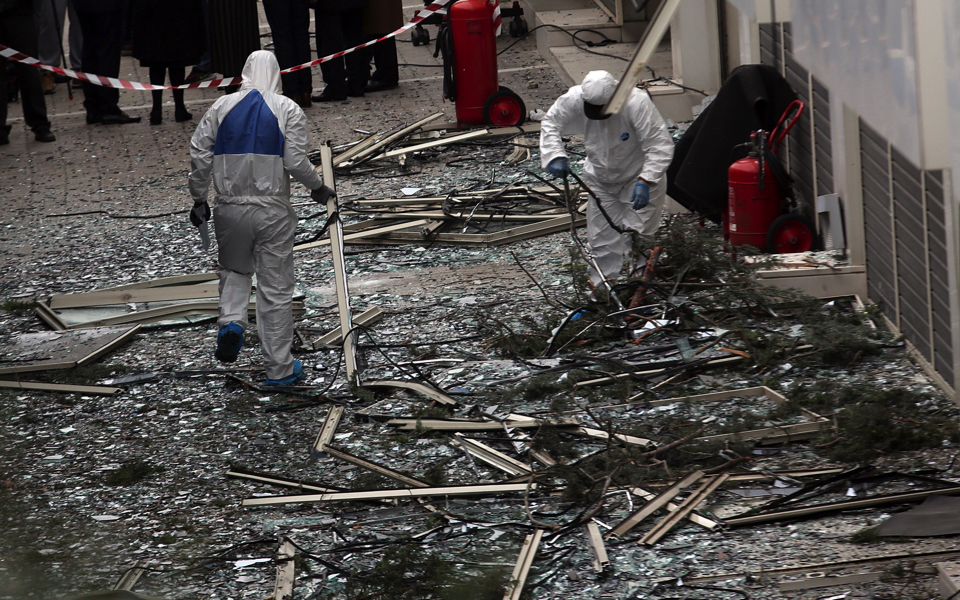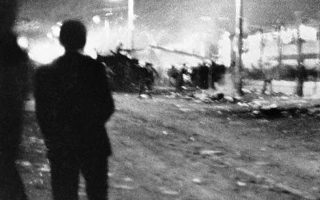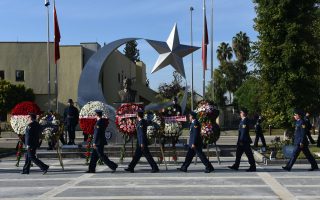Driven by division

The perpetrators of bomb attacks on members of the judiciary, on news media and on economic targets are members of small groups who believe that they have the authority to express the “resistance” of many against the “system.” The attacks are a threat and a declaration of intent, proof that even as the fashion of leftist terrorism has died out in other European countries, having run itself into a dead end, in Greece there is plenty of space for self-declared “revolutionaries” and “avengers.” This is not because Greece’s police are incompetent, in comparison to their peers elsewhere, but because here there is a climate that not only tolerates but often encourages extreme forms of expression in the public space. And so, the phenomenon endures, the violent groups continually replenishing themselves.
Today, the political polarization that breeds such violence is intensifying. Indicative of this is the fact that although almost all involved in public life condemn terrorist attacks, they usually interpret them differently – in whichever way will allow them to cast blame on their political rivals. It is not self-evident that an attack on a judge or on a news medium is to be condemned without equivocation as an attack on the life of a human being, as a threat to a polity that exists to the benefit of all its members. The differing positions and “whataboutism” mean that in the end, everyone is where he or she was before the attack and the condemnations. There is no concerted effort to mobilize society against violence in a way that will be convincing and effective because a significant part of our population believes that the violence will not affect them.
But why such tolerance of violence? Why do some of our compatriots feel good about the threats, the deaths which result from this tolerance? How is it that in a country where citizens really don’t have that much to fight over, at a time when only a national effort will allow us to cope with the challenges we face, people remain trapped in division? Why do we maintain divisions which, as we have seen so often in the past, lead only to catastrophe?
The years of the crisis have brought about great political, economic and social change. As we head toward elections in a climate even more polarized than usual, we ought to make an effort to understand why our politicians have proved incapable of leading society toward unity and cooperation.
From the time that Costas Karamanlis was prime minister, when it was evident that Greece was heading for a crash, there were persistent calls for a national effort to deal with our problems. And yet, George Papandreou, then in opposition, found himself unable to support Karamanlis, calling instead for elections. Then, Antonis Samaras, who had won New Democracy’s leadership contest, could not bring himself to support Papandreou. If he had, their two parties, which represented 80 percent of the electorate, would have been able to carry out reforms with much greater determination and legitimacy, and they could have presented a stronger case to creditors, which could have alleviated some of the problems caused by austerity. Instead of this happening, the political center fragmented. Alexis Tsipras’s SYRIZA, in cooperation with a party comprising the most extreme right-wing splinter of New Democracy, in alignment with neo-Nazi Golden Dawn, exploited a constitutional trap that is sprung when a candidate for president cannot gain enough votes in Parliament; he forced early national elections and came to power, along with extreme right-wing nationalist Panos Kammenos. These tactics alone explain, to a large degree, the persistent polarization: Those who were in government previously feel that they were brought down unfairly and seek to make life difficult for their rivals in any way they can, while those who are in power got there by exploiting division, by presenting themselves as paragons of virtue and their rivals as the devil’s lackeys. In short, the sowing of division between “good” and “bad,” between responsible and irresponsible politicians, between patriots and traitors, and so on, provides for handsome returns in politics. That is reason enough to persist with destruction and self-destruction.
If we look at our political scene’s protagonists, we see that there is not much difference between them. All had opportunities to rise in politics (whether they belonged to political dynasties or not, whether handpicked by party leaders or not) without facing the dangers and deprivations of the Greece of old. Unlike previous eras where losers could be exiled, or worse, they had everything to gain and nothing to lose. This, instead of encouraging cooperation, often encouraged maximalistic positions. Some party leaders went to the same, or similar schools and colleges. They were raised in a climate of tolerance and prosperity, with Greece’s participation in Europe’s unification providing unprecedented security and untold opportunities. In essence, our political party leaders do not express the old divisions between representatives of the Enlightenment and tradition (as they, like their followers, are united by their passion for power and its spoils, which is the dominant ideology of our time). Nor do class differences drive developments. But our leaders, and their followers, call on the trauma of civil war and dictatorship to explain their current positions and actions, showing that the past is their chief source of reference. Rivals are routinely referred to as traitors and fascists – half a century after the dictatorship, nearly 70 years after the civil war.
These divisive lines appear between people who had no experience of the traumatic events of the past (in many cases neither did their parents), and they use them to navigate the present. In the years of borrowed prosperity, this mentality was almost dormant, only to spring back stronger than ever in the years of deprivation and insecurity. It is as if we cannot handle the present with the tools and behaviors that it demands, and we rush back to the past to pick our sides, to justify our stance, to seek refuge in the absolutes of an idealized past that is free of today’s complications. A symbol of this absurdity is the Tsipras-Kammenos alliance, a coalition of the ostensibly radical left with the far right, which shows how irrelevant ideology has become among the heirs of the two sides of real conflicts.
In this climate, there will always be people and groups who want to act out, with real violence, the verbal hatred that dominates public life. When their role models are presented without blemish, without context, without responsibility, when they see convicted terrorists being treated as celebrities, when they believe that they, too, will achieve similar levels of adulation from their peers, it is much easier for young people to believe their fantasies that they can be stars of their own productions, that they can overturn the defeats of heroic predecessors and avenge their enemies (or their enemies’ grandchildren) for those defeats.
Rather than repeating vain appeals for our political protagonists to find common cause for the sake of the nation, it is time to press them to look at the real differences between them. Are these differences substantial or are they just trapped in divisive behavior because they are too scared to stray outside the mechanisms of division? Because what it comes down to is that we are divided not because of ideological or class differences, but because we need division as a driving force of our politics. We divide ourselves into conflicting groups because that is how the game is played and because we don’t know how else to play. Division is the illness of our politics, not the symptom.





